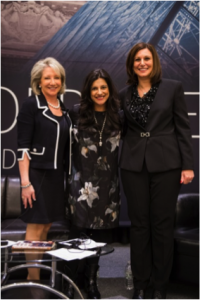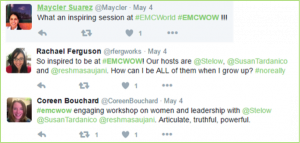I’ve had the privilege of hosting Women of World at EMC World for the past three years. The event is always a highlight of the year for me because it serves as a unique opportunity for attendees to come together, network and share ideas while hearing from inspirational women from all walks of life.
Speakers in past years have come from fields spanning biotechnology, sports, politics, neuroscience and software engineering. We’ve met women who were trail blazers in their fields in male dominated industries, and even delved into the science behind male and female brains.
This year, due to the amount of unprecedented change taking place in the IT industry (including major changes coming here at EMC) we focused on how to own, modernize and direct our careers in the context of change. It’s also worth noting that in 2015 out of 359 incoming CEOs at the world’s 2500 largest companies, only 10 were women. This is astounding to me and shows that women need to take ownership of their careers today, if we want to make more of an impact tomorrow.
To explore how we can encourage women to dream bigger, step up and get noticed, we enlisted the help of two esteemed guests: Susan Tardanico (@SusanTardanico), career consultant and founder and CEO of the Authentic Leadership Alliance and Reshma Saujani (@reshmasaujani), Founder & CEO of Girls Who Code and author of Women Who Don’t Wait in Line.
 Addressing an audience of more than 300, both women shared their thoughts on successful career management when uncertainty is high, dealing with fear of the unknown, the importance of embracing risk and failure and how fear can be reframed as a catalyst for positive change.
Addressing an audience of more than 300, both women shared their thoughts on successful career management when uncertainty is high, dealing with fear of the unknown, the importance of embracing risk and failure and how fear can be reframed as a catalyst for positive change.
Susan was first to share insights from her experience as a career consultant, and as someone who has reinvented her own career many times over. When things are changing rapidly, Susan acknowledged that change is scary and it’s common for individuals to ignore their fears or refrain from speaking up.
However, rather than shy away, Susan believes a much more effective method is to face into anxiety head on, think strategically and find a solution like we would with a business problem.
“Confront reality. What’s the worst that could happen? What’s the best? What’s the most likely scenario? Then, act accordingly….”
Rather than viewing change as scary and unwelcome, Susan suggests that we view it as an opportunity to take stock of what we really want and define our skill sets. Change can be a catalyst for reinvention and career advancement if framed properly. Let your response to change define you.
Susan also addressed a common issue that many women (and men) face called “the imposter syndrome.” The imposter syndrome is a persistent feeling of self-doubt despite having achieved true success. One concrete example of this can be seen in the way that men and women handle a job search. When women are reviewing career opportunities, an alarmingly high percentage will think “Why do I have the right?” or “Can I do this?” while men will say “why not?” and “Of course I can do it”.
To combat these feelings of self-doubt, Susan recommends that we take time to understand and embrace our strengths, know our value and “lean into” new possibilities. One practical way to do this is to define our transferrable and highly sought after skills (such as managing and motivating a team) and personal attributes (such as keeping calm under pressure) to help expand our “universe” of possible opportunities.
Next, Reshma Saujani joined the discussion to share what she’s learned along her personal journey from attorney and activist to Founder and CEO of Girls Who Code.
Reshma shared that early on in her career she became obsessed with figuring out why the female leadership gap exists. She suggests that a “bravery deficit” in women may be the root cause. From an early age, girls and boys are conditioned differently, with girls taught to act perfectly and boys taught to be brave (climbing trees, jumping from high branches, etc.) As a result, women gravitate towards things that they’re good at, while men tend to be okay with failure and risk-taking. This has serious implications for how women approach job opportunities later in life because we often shy away from anything new, different or seemingly difficult. No wonder we don’t get the jobs we strive for – we don’t apply for them!
Currently, Reshma spends her time leading an organization that directly addresses the gender gap in STEM (Science, Technology, Engineering, and Math) fields by teaching young women the computing skills necessary for opportunities that have typically gone to men. By the end of 2016, the organization will reach more than 40,000 girls in every state and 90 percent of alumnae have declared or intend to declare a major or minor in computer science. Through this experience, Reshma has seen first-hand evidence of a bravery deficit and fear of failure in girls. She commented:
“When girls learn to code and find it difficult, they don’t ask if there is something wrong with their code like the boys do. They ask if there is something wrong with themselves!”
In her personal life, Reshma has learned from this experience and prefers to take risks by going for the things that she has no chance of getting. Her willingness to step up even when failure is far more likely serves as an inspiration to all of us.
However, Reshma was quick to remind everyone that the path to success was not an easy one. It was filled with heartache and disappointment. For example, when she ran to become the first Indian American woman elected to Congress, she lost. Big. But despite it all, she threw caution to the wind, stood up for the causes that were important to her, met outstanding people along the way and set herself up for later success as the current CEO and Founder of Girls Who Code. So, maybe she didn’t lose after all…
 Susan and Reshma’s guidance served as an invaluable reminder of how to navigate a world of unprecedented transformation. 2015 may not have been the year of the female CEO, but it’s not too late to reverse this trend by being more strategic in how we to prepare for impending change, by understanding our worth and by learning to be comfortable with our imperfections. Only then can we start to dream bigger and be resilient through failure. Then we will succeed…even if we doubt how we did it later.
Susan and Reshma’s guidance served as an invaluable reminder of how to navigate a world of unprecedented transformation. 2015 may not have been the year of the female CEO, but it’s not too late to reverse this trend by being more strategic in how we to prepare for impending change, by understanding our worth and by learning to be comfortable with our imperfections. Only then can we start to dream bigger and be resilient through failure. Then we will succeed…even if we doubt how we did it later.